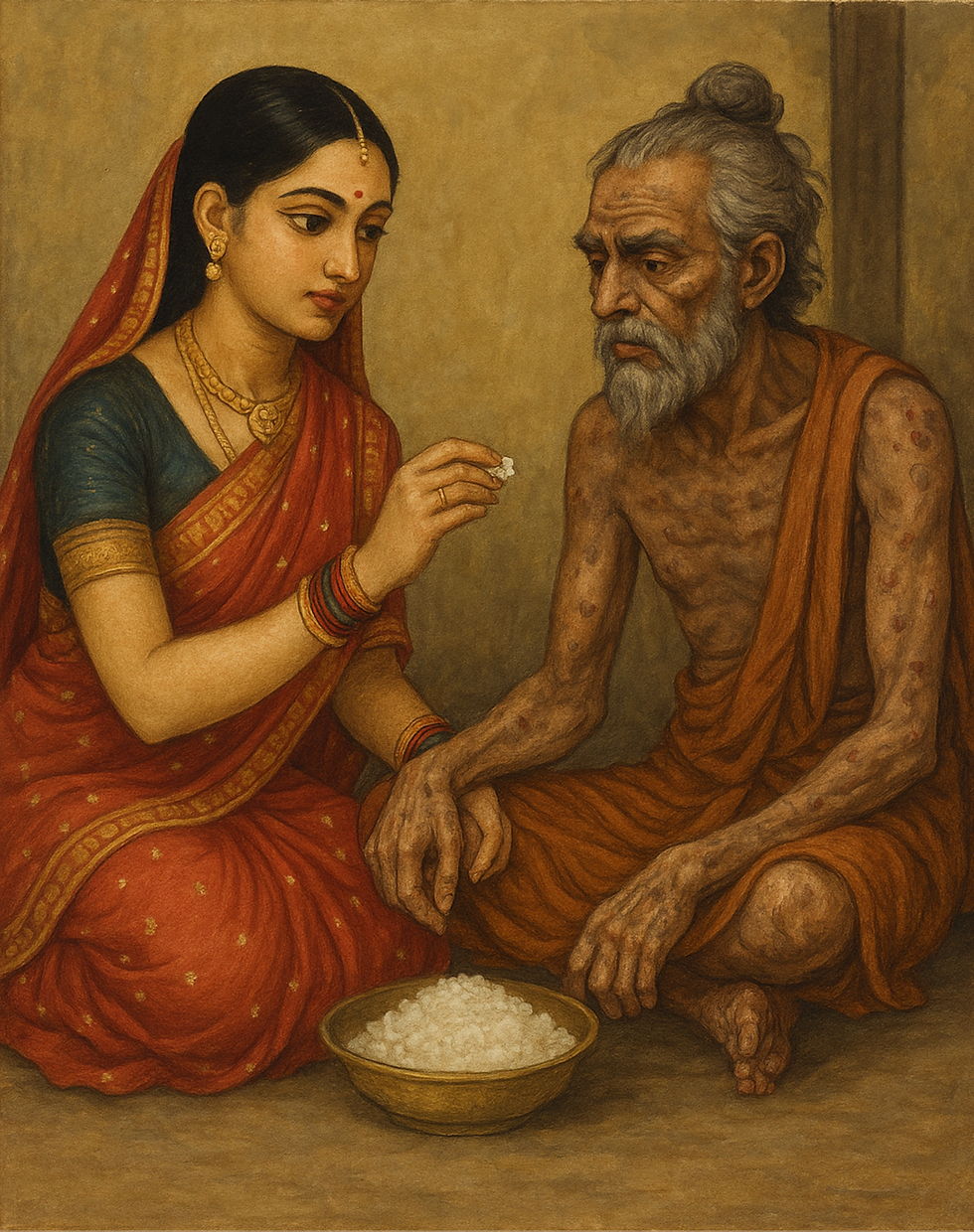Mā Sītā and Draupadī: The link between Rāmāyaṇa and Mahābhārata
- Manjukeshwar Mandadi Reddy
- Aug 19, 2025
- 4 min read
When we read our purāṇas and itihāsas with care, we discover fascinating connections across texts. The 9th Skandha of the Devī Bhāgavata and Chapters 197–198 of the Ādi Parva of the Mahābhārata offer profound insights that beautifully link the stories of the Rāmāyaṇa and the Mahābhārata. These sources help us understand questions that often puzzle seekers:
Why did Mā Sītā enter the fire of Agni?
Why was Draupadī Devī destined to have five husbands?
Sadly, when we are disconnected from the source texts, we fall prey to misconceptions and incomplete retellings. A close reading of the originals clears this confusion and reveals a deeper harmony in the narratives.

(i) Māyāsītā – From the Devī Bhāgavata (9th Skandha)
During the exile of Śrī Rāma, when He, Lakṣmaṇa, and Sītā were dwelling in the forest, Agni appeared privately before Bhagavān Rāma and said:
“O Rāma, your incarnation is for the destruction of Rāvaṇa. Soon, he will come to abduct Sītā. But since she is the incarnation of Śrī Lakṣmī, it is not proper that Rāvaṇa should so much as touch her. Therefore, I will safeguard the real Sītā with me. In her place, I shall give you Māyāsītā—a phantom Sītā.”
Śrī Rāma handed over the real Sītā to Agni and received Māyāsītā in her stead. Even Lakṣmaṇa was unaware of this divine exchange. Thus, when the golden deer (which was in truth Mārīca) appeared, and Rāma pursued and killed it, Māyāsītā was the one left in the hut. When Rāvaṇa arrived, it was Māyāsītā whom he abducted and carried away to Laṅkā.
The great war followed. Rāma killed Rāvaṇa with the help of the vānaras and took Sītā back to Ayodhyā. But bound by public opinion, Rāma subjected her to the ordeal of fire (agniparikṣā). At that very moment, Agni returned the real Sītā, unscathed and radiant, and revealed the truth. Māyāsītā, released from her role, bowed before Rāma and Agni and asked:
“What is my path now? Where should I go?”
They instructed her to go to Puṣkara and undertake penance. She did so with deep devotion, and Paramaśiva, pleased with her austerities, appeared before her and asked her boon. Māyāsītā, who through tapas had now become Svargalakṣmī, pleaded again and again, “patiṃ dehi, patiṃ dehi”—“Grant me a husband.” She uttered this prayer five times. Śiva then blessed her:
“You shall have five husbands in your next birth, when you will be born as the daughter of King Drupada of Pāñcāla, bearing the name Kṛṣṇā.”
Thus, Māyāsītā’s journey was not an end but a preparation for her rebirth as Draupadī, destined to become wife to five heroes.

(ii) Nālāyaṇī (Indrasenā) – From the Mahābhārata, Ādi Parva (Chs. 197–198)
Another account tells of Nālāyaṇī, also called Indrasenā, who was the devoted wife of the sage Maudgalya. Though her husband was aged, irritable, and eventually diseased with leprosy, she never wavered in her service. Once, when a finger from his diseased hand fell into his food, Nālāyaṇī calmly removed it and ate the rice with devotion.
Deeply moved, Maudgalya granted her a boon. She asked to share an amorous life with him in manifold forms. By his blessing, they roamed for thousands of years: when he became a mountain, she became a river; when he a flowering tree, she a creeper entwined around him.
At last, the sage renounced worldly pleasure and returned to ascetic life. But Nālāyaṇī, still filled with desire, begged him not to abandon their union. Angered at her persistence, Maudgalya cursed her:
“In your next life, you shall have five husbands to satisfy your lust!”
Crushed by grief, she undertook a fearsome penance, standing amidst the pañcāgni. Lord Śiva, pleased with her tapas, granted her consolation:
“You shall indeed be reborn with five husbands, but they will be noble men, devoted to dharma and equal in strength to Indra. Furthermore, you shall remain ever-virgin with each husband, by divine boon.”
Śiva then led her to the Gaṅgā, where she encountered Indra himself. In a divine play, Śiva revealed to her five Indras—four created anew, and the original one—saying, “These shall all be your husbands when you are born as the daughter of Drupada.”
The devas, too, took part in this design. Later, Mahāviṣṇu plucked two hairs from his body—one black, one white—which incarnated as Śrī Kṛṣṇa and Balarāma, destined to support these five Indras, who would be born as the Pāṇḍavas.
The Deeper Link
From these accounts, Draupadī’s destiny becomes clear:
Māyāsītā, transformed into Svargalakṣmī, prayed five times for a husband and was reborn as Kṛṣṇā, destined for five.
Nālāyaṇī, cursed yet blessed, was granted by Śiva the boon of five noble husbands, remaining a virgin with each.
Thus, Draupadī Devī was no ordinary woman in her previous births. She was the confluence of these divine threads, embodying the grace of Mahālakṣmī, carrying forward the destiny of both Māyāsītā and Nālāyaṇī in their previous births. Her five husbands, the Pāṇḍavas, were themselves sons of gods—Indrāṃśas—fulfilling the promise that she would be wife to five Indras.
Conclusion
When we neglect our sacred texts, we lose sight of these harmonies and fall prey to incomplete versions. But when we return to the sources, we rediscover the beauty of the cosmic play—how the Rāmāyaṇa and the Mahābhārata speak to each other, revealing that dharma is one continuous unfolding across ages.
May this inspire us to approach the originals with reverence, and to see Draupadī Devī not as ordinary, but as the divine Śakti who carried forward the threads of lifetimes for the upholding of dharma. Om Muruga!



Comments